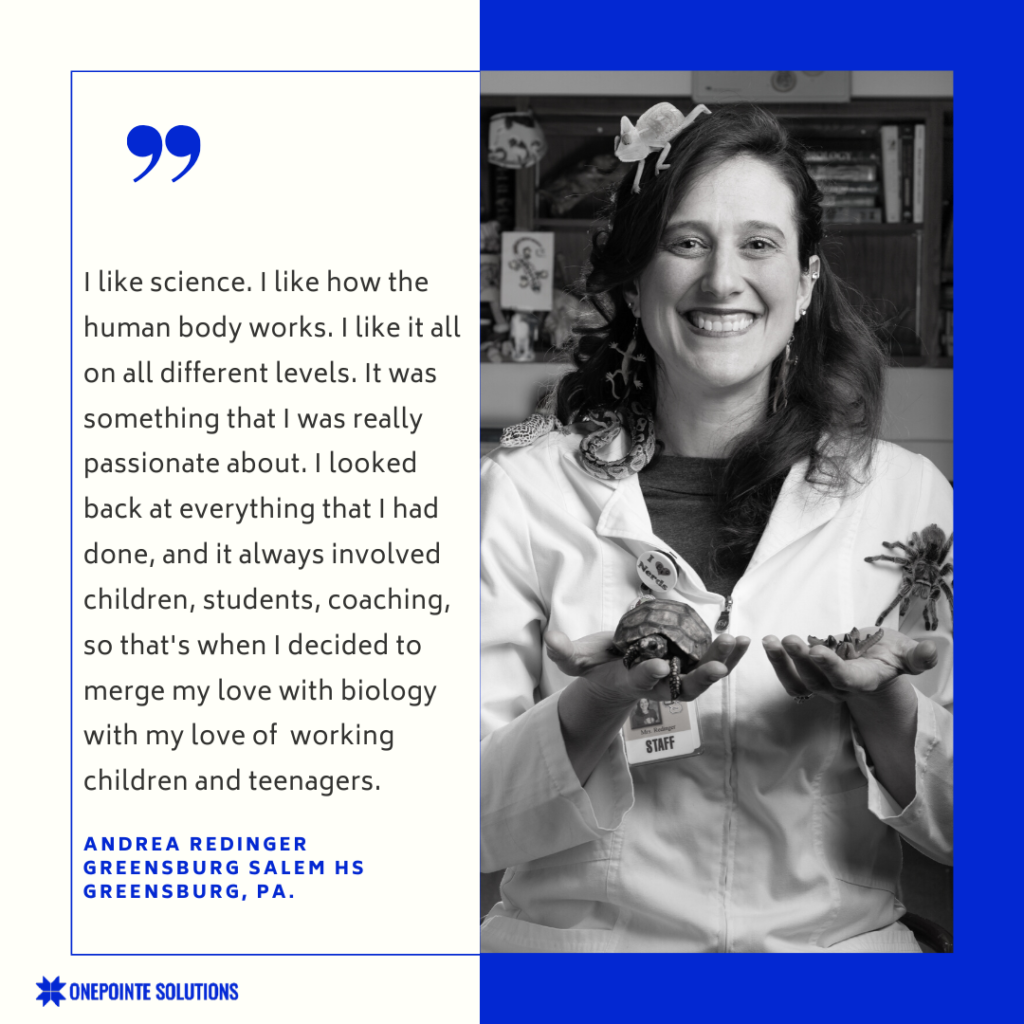
Under the Microscope is a new series of interviews from OnePointe Solutions aimed at highlighting the various heroes of the hallways in high schools and colleges across the country. First up, is Andrea Redinger,a biology teacher from Greensburg Salem High School in Greensburg, Pennsylvania.
What challenges do you face as a high school biology teacher that people may not understand?
Meeting the needs of every student on an individualized basis. We have students coming in and sometimes the needs are like, can we get them food, can we help clothe them? We have students coming in with a multitude of different home lives, so we’re about 45% that are on free and reduced lunches. So, those needs sometimes stretch beyond the educational needs.
When you look at the educational needs in a classroom, I may have my very high flyers, gifted education students, that I need to make sure I’m providing enrichment for, and accelerating them through, but then I may have my very low learners, some students with life skills needs, and then I have the middle of the pack. They could all be in the same classroom and I need to make sure that they learn the content all at the same level.
How has COVID-19 changed the way you teach and interact with the students on a daily basis?
I have never taught from a textbook. I’m not a cookie-cutter worksheet, cookie-cutter type of a lab (teacher). Everything is hands on, even on days when I may have to deliver one-on-one instruction. It’s always interactive, and right now I’m really struggling to find something to replicate what I do in the classroom. I am finding that I have more time to allow students to show what they know in different means. For my final projects, I just received a bunch of songs that were written about biology. Some were heavy metal, some were children’s songs, but that was how they opted to show me what they know. Some are making videos, some are doing scrapbooks. It’s different in that aspect, but again, we put our students in those homes where they may not have support, where they may have difficulty working, where they may just be worried about where they are going to get their next meal. It’s very hard to balance it.
It also makes you think differently. Are there more things that I could possibly have online if I had a student that was opting to take part of my course online? So it made me explore some more resources, but I’m finding that nothing is really replicating what I do in my classroom.

What attracted you to the field of biology in the beginning?
I love biology, and I love science in general. I really enjoy animals, so I thought veterinary maybe at some point, but I like science. I like how the human body works. I like it all on all different levels. It was something that I was really passionate about. I looked back at everything that I had done, and it always involved children, students, coaching, so that’s when I decided to merge my love with biology with my love of working children and teenagers.
After teaching biology for 17 years, how do you keep the material interesting and relevant?
My accelerated biology class is lined up completely with state standards in Pennsylvania, but we’re looking to revamp them right now. They are very old, very outdated. I kind of have to stick to that, but how I do my assessment, and how I assess my students is always changing. They’re learning the same content, but I’m switching up the lab activities. Our standards are pretty outdated, but we actually have a committee right now working to update them so that they mesh more with what’s going on with science and the rest of the United States where it’s more hands on.
In my upper level courses, I learn something new every year. My plant and biology classes are growing different things. I house about 16 different species of animals in my classroom, so there’s always something different. Two years ago, I said ‘alright, we can look into getting a snake so we can research the snake’, and then all of a sudden I have a snake and students are becoming experts on the snake and teaching me things about it. Same thing with my biotechnology course. We go observe surgeries, and I’m learning something new every time we see a different surgery. I have biomedical engineers come into my classroom, and we design artificial heart valves. Every time I come in contact with a different professional, I’m learning from them.
My students have to teach their classmates, so they all become their own experts in little areas of the medical field, and then they come back and they’re teaching me as well.
What do you find the most rewarding about your jobs?
Seeing them after they graduate and hearing all of the success stories. A lot of them keep in touch with me, so seeing how their pathways have changed or helping them along their pathways. If I start with them in ninth grade, I can see where they end up in 12th grade, and where they’re going, be it into a career or heading off to college. Just being able to watch them along their journey and be a part of that.
Andrea Redinger teaches biology at Greensburg Salem High School in Greensburg, Pennsylvania. She received her bachelors of science in biology from Saint Vincent College, and her masters of science in science education from Duquesne University. She’s actively involved in the science teaching community, serving on several boards and committees, including the Pennsylvania Teachers’ Advisory Council (PTAC) and the NSTA (National Science Teachers Association) Conference Planning Committee.


